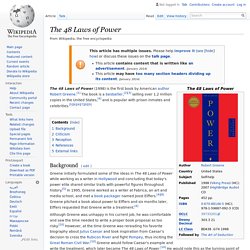

The 30 Best Fantasy Book Series of All Time. Some readers equate fantasy with hobbits and magic wardrobes.

Others conjure images of a wizard P.I. in Chicago or a gunslinger in a magical Wild West. And that is the beauty of the genre. Fantasy thrives on the creation of new worlds, species and magic systems. It allows for the impossible to occur—for elves to fall in love with humans and for street urchins to wield magic. Fantasy introduces readers to adventures starring world-conquering villains and selfless heroes (or, sometimes, tender-hearted villains and amoral heroes).
Useful and Inspirational Travel Books – Fun Cheap Travel. Tolstoy’s Reading List: Essential Books for Each Stage of Life. Shortly after his fiftieth birthday, Leo Tolstoy succumbed to a deep spiritual crisis and decided to pull himself out by finding the meaning of life.
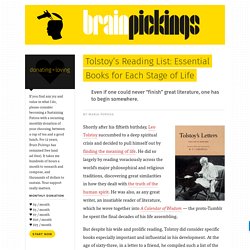
10 Scary Books That Will Seriously Keep You Up At Night. King Leopold's Ghost. King Leopold's Ghost (1998) is a best-selling popular history book by Adam Hochschild that explores the exploitation of the Congo Free State by King Leopold II of Belgium between 1885 and 1908, as well as the atrocities that were committed during that period.
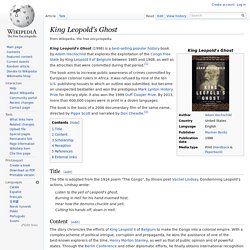
The book aims to increase public awareness of crimes committed by European colonial rulers in Africa. It was refused by nine of the ten U.S. publishing houses to which an outline was submitted, but became an unexpected bestseller and won the prestigious Mark Lynton History Prize for literary style. It also won the 1999 Duff Cooper Prize. Pollyanna. Pollyanna is a best-selling 1913 novel by Eleanor H.

Porter that is now considered a classic of children's literature, with the title character's name becoming a popular term for someone with the same optimistic outlook.[1] The book was such a success that Porter soon produced a sequel, Pollyanna Grows Up (1915). Eleven more Pollyanna sequels, known as "Glad Books", were later published, most of them written by Elizabeth Borton or Harriet Lummis Smith.
Further sequels followed, including Pollyanna Plays the Game by Colleen L. Reece, published in 1997. Plot summary[edit] The title character is named Pollyanna Whittier, a young orphan who goes to live in Beldingsville, Vermont, with her wealthy but stern Aunt Polly. With this philosophy, and her own sunny personality and sincere, sympathetic soul, Pollyanna brings so much gladness to her aunt's dispirited New England town that she transforms it into a pleasant place to live. Influence[edit] Pollyanna is still available in reprint editions. Dokkōdō. The "Dokkōdō" [ (Japanese: 独行道?)

; "The Path of Aloneness", "The Way to Go Forth Alone", or "The Way of Walking Alone"] is a short work written by Miyamoto Musashi (宮本 武蔵) a week before he died in 1645. It consists of either nineteen or twenty-one precepts; precepts 4 and 20 are omitted from the former version. "Umrao Jan Ada" (1899) by Muhammad Hadi Rusva; a study site by Frances W. Pritchett. Dokkōdō. Night Shift (book) Children of the Corn. Plot[edit] In one final, desperate attempt to save their marriage, Burt and Vicky, a bickering couple, are driving to California for vacation.
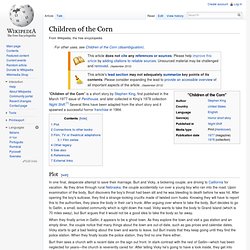
As they drive through rural Nebraska, the couple accidentally run over a young boy who ran into the road. Upon examination of the body, Burt discovers the boy's throat had been slit and he was bleeding to death before he was hit. After opening the boy's suitcase, they find a strange-looking crucifix made of twisted corn husks. Knowing they will have to report this to the authorities, they place the body in their car's trunk. When they finally arrive in Gatlin, it appears to be a ghost town. Burt then sees a church with a recent date on the sign out front. The Alchemist (novel) The Alchemist (Portuguese: O Alquimista) is a novel by Paulo Coelho first published in the year 1988.
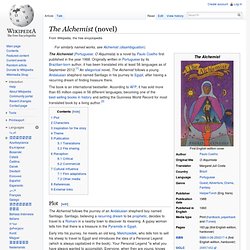
Originally written in Portuguese by its Brazilian-born author, it has been translated into at least 56 languages as of September 2012.[1] An allegorical novel, The Alchemist follows a young Andalusian shepherd named Santiago in his journey to Egypt, after having a recurring dream of finding treasure there. The Ear, the Eye and the Arm. The book combines elements of science-fiction and African culture, and depicts the struggle of a notorious general's three children to escape from their kidnappers in the crime-infested capital of Zimbabwe.
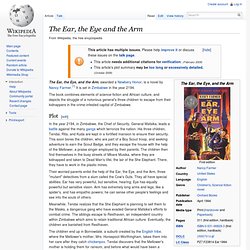
Plot[edit] In the year 2194, in Zimbabwe, the Chief of Security, General Matsika, leads a battle against the many gangs which terrorize the nation. His three children, Tendai, Rita, and Kuda are kept in a fortified mansion to ensure their security. The Story of My Experiments with Truth. The Story of My Experiments with Truth is the autobiography of Mohandas K.
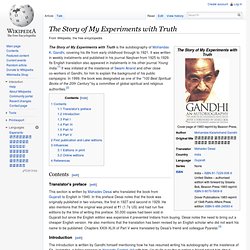
Gandhi, covering his life from early childhood through to 1921. It was written in weekly instalments and published in his journal Navjivan from 1925 to 1929. Its English translation also appeared in instalments in his other journal Young India.[1] It was initiated at the insistence of Swami Anand and other close co-workers of Gandhi, for him to explain the background of his public campaigns. The Fight for Jerusalem: Radical Islam, The West, and The Future of the Holy City eBook: Dore Gold. The 48 Laws of Power. Background[edit] Greene initially formulated some of the ideas in The 48 Laws of Power while working as a writer in Hollywood and concluding that today's power elite shared similar traits with powerful figures throughout history.[5] In 1995, Greene worked as a writer at Fabrica, an art and media school, and met a book packager named Joost Elffers.[4][8] Greene pitched a book about power to Elffers and six months later, Elffers requested that Greene write a treatment.[4]
